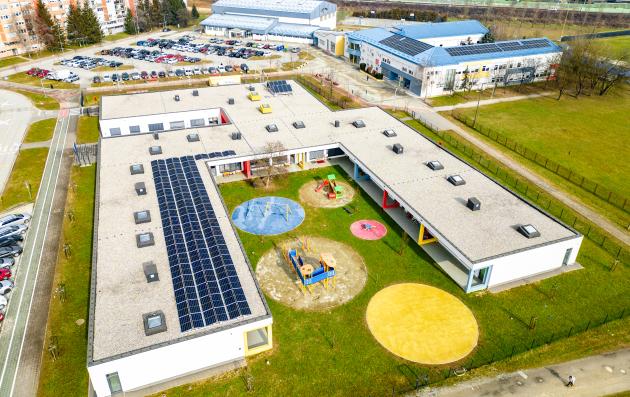Date of label : 29/10/2024
-
Karlovac , Croatia
-
Size of city : 49.377 inhabitants

Aerial view of an area featuring buildings with solar panels on the roof and recreational facilities.
Summary
The Solar energy in public buildings (SolariKA) good practice involves the installation of solar power plants in educational institutions in Karlovac (HR), through the implementation of 14 pilot projects with a total capacity of 0.45 MW for self-sufficiency. This initiative reduces CO2 emissions, benefitting the environment. The pilot projects demonstrate to property owners, authorities in Karlovac and the wider community how solar infrastructure activities are carried out. The projects address solutions for the key problem of energy dependence of public institutions in the city, and optimising the use of the electricity distribution grid.
The solutions offered by the Good Practice
The good practice encourages energy-efficient renovations in multi-apartment buildings and public institutions, and promotes the installation of renewable energy systems, such as solar panels on public buildings.
Since joining the Convenant of Mayors in 2008, the city of Karlovac has been exchanging experiences in energy-sustainable urban development to adapt the European Green Deal to its local needs. As a result of interactions in this network, Karlovac adopted a new Sustainable Energy and Climate Action Plan (SECAP) which set targets to reduce energy consumption, and to reduce CO2 emissions by more than 40% by 2030.
The solar energy in public buildings project SolariKA is one of a series of projects in energy efficiency and renewable energy sources the City of Karlovac is implementing to achieve these goals. The key objective is to promote renewable energy awareness, especially among young people.
Building on the sustainable and integrated urban approach
The good practice aligns with other European, national, local renewable energy and environmental protection strategies. Sustainable energy sources is the main focus.
The practice is not isolated, it forms part of a series of complementary projects financed through Interreg or other European programmes.
Another major goal of the city administration is to further develop geothermal energy for heating in Karlovac, with preparatory steps already underway. This energy source is expected to bring social, economic and enviromental benefits.
Based on participatory approach
This practice mainly targets property owners, users of buildings where renewable energy is being installed, and the City of Karlovac which manages budget and the costs of institutions. Secondary targets are users of public buildings generally, to promote awareness of the benefits of renewable energy sources.
Numerous promotional and educational activities have been carried out, engaging all the target groups but especially young people, making them participants in the project and thereby contributing to clean energy use.
What difference has it made?
The Solar energy in public buildings practice delivered clear benefits:
- Solar energy production: Solar now provides 62% of the total energy in the properties involved.
- Energy cost reductions: Lower energy costs for participating institutions.
- Better renewable energy skills: Increased capacity for renewable energy use and promotion.
- Installed renewable capacity: Solar panels in place on the participating institution’s buildings.
- Reduced CO2 emissions: Lower emissions for all participating institutions.
Both the stakeholders and the City of Karlovac gain in energy independence and are able to redirect cost savings to other priorities that support the SECAP objectives.
The project covers 14 public institutions, including 6 elementary schools with around 3 600 pupils, and seven kindergartens with approximately 1 500 children. Energy savings for these institutions will be verified soon.
Why this Good Practice should be transferred to other cities
The good practice aligns with several policy frameworks:
- Sustainable Development Goals (SDGs): SDG 11 (Sustainable cities and communities) and SDG 13 (Climate action).
- The Urban Agenda for the EU, particularly energy transition needs.
These policy priorities are common throughout Europe, making the practice in Karlovac transferable and relevant for many other local administrations. The project also advances Croatia’s Energy Development Strategy and its Low-carbon Development Strategy, and other national strategies related to green energy.
This good practice has been shared with partners from Turkey and Lithuania, during study visits to Karlovac in May 2024 that showcased the pilot schools. The project has also been presented several times at national level.
The good practice of installing solar energy in schools in Karlovac can be easily adapted throughout Europe, as this is a common goal in the EU. The preliminary analysis of public buildings, strong communication, stakeholder participation, and transparency enhance transferability and success.
Key benefits of transferring the approach include reduced heating costs, energy resources resilience, CO2 emissions reductions, and improved education and awareness of energy transition issues among the general public.
